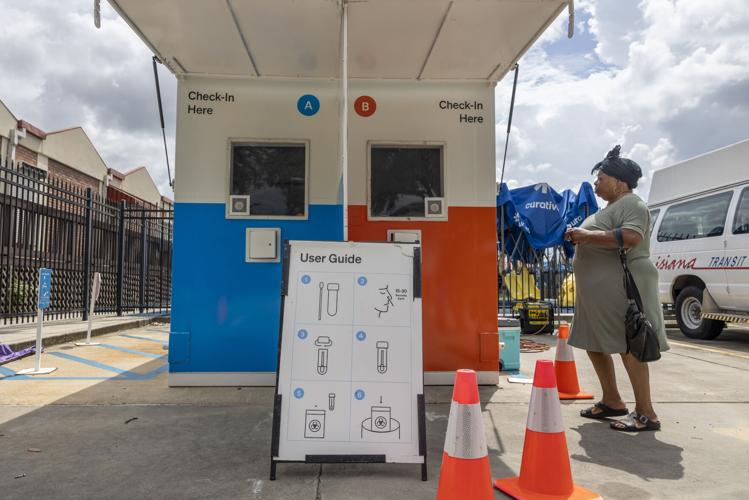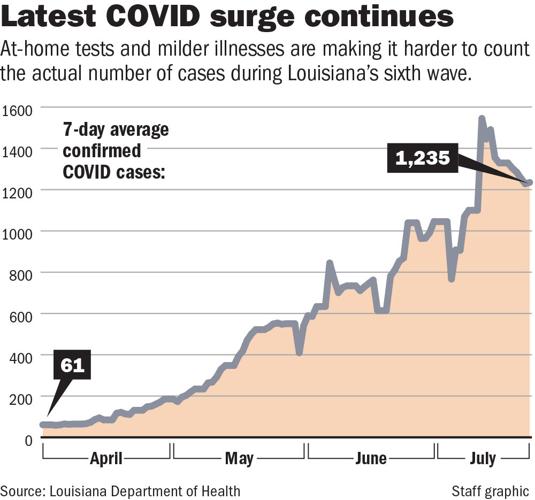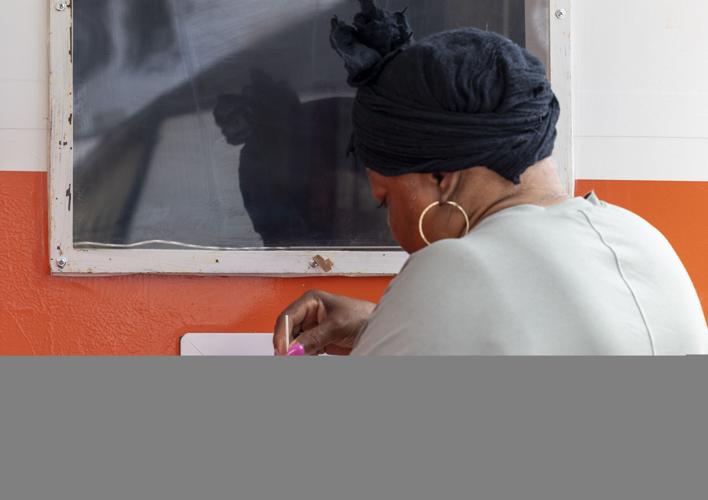Louisiana is in the thick of its longest COVID surge and there isn't a plateau in sight. But this time around, with most of the population having some protection from vaccines or prior infection, the message from public-health officials is that personal precautions are a good idea even if new mandates and restrictions aren't needed.
Over the last week, about 1,234 new cases were confirmed in Louisiana each day. That’s about 200 more daily since the beginning of July and does not account for at-home tests. Before the surge, cases were at around 100 daily, an all-time low. All 9 LDH regions of the state are considered hotspots.
The percentage of tests coming back positive for COVID went up again this week to 28.6% statewide after steadily rising since April. The percent positive rate offers an indication of how broadly the virus is spreading.
“That’s about as high as we’ve ever been,” said Dr. Joseph Kanter, the state health officer at the Louisiana Department of Health. “Hospitalizations also continue to go up. They’re not anything close to where we have been before, but it’s still a notable increase.”
But rather than returning to mandates and other restrictions, local health officials in Louisiana and across the country are mainly riding this one out. While Louisiana’s hospitalizations are concerning – there were 730 people hospitalized with COVID on Friday – the vast majority of people who are infected have illnesses more like a cold or the flu.
That also includes President Joe Biden, who was diagnosed with COVID this week, has taken Paxlovid, an antiviral and has reported only mild symptoms.
In Louisiana, that’s thanks to 95% of the population having some immunity from vaccination, past infection or both, and the development of treatments, said Kanter.
“We can weather a big surge like this without coming nearly as close to overrunning our hospitals as we have at times,” he said.
Still, Kanter and other health experts also point out that overcrowded hospitals are not the only measure the public should use to gauge their risk. Recent studies suggest about one in five infected people develop long COVID. A study published in JAMA Network Open showed that pregnant women who got COVID had an increased risk of preterm delivery and infant neurodevelopmental issues with motor function or speech and language.
“There still are risks,” said Kanter. “You don’t want to get COVID if you have any say in the matter.”
A surge within a surge
There has not been a sustained sign of a plateau in Louisiana’s numbers since April. That’s because Louisiana is experiencing a “surge within a surge,” said Kanter, with the initial uptick fueled by an earlier version of the Omicron variant and the more recent infections caused by the BA.5 variant, which is the most transmissible version yet.

About 59% of Louisiana’s infections are from the BA.5 variant, according to the state health department.
As a result, it’s hard to say when Louisiana residents will stop getting so many emails about infected coworkers or texts from a recent acquaintance who has gotten a positive test.
“I suspect it’s going to keep going up,” said Dr. David Mushatt, an infectious disease expert at Tulane University. “We don't really know for sure why the surge ends, believe it or not.”
Ochsner returns to masking
COVID is still managing to impact hospitals despite the mostly milder illness it has been causing recently.
Ochsner Health is returning to mandatory masks starting Monday morning for patients and employees in all clinical areas due to the increase in community spread and the number of workers who are out sick, said Dr. Sandra Kemmerly, the system medical director of hospital quality.
The hospital system, Louisiana’s largest, had relaxed masking in some areas of its hospitals in May.
But despite the tick higher in cases and hospitalizations, some local hospital officials say these numbers, in particular the hospitalizations, still aren't close to the worst COVID has had to offer through the pandemic.
Dr. Aldo Russo, Ochsner Health's regional medical director in Baton Rouge, said the majority of patients who do wind up in the hospital are not vaccinated or are partially vaccinated. But he added that improved therapeutics after infection helped keep patients from suffering many of the worst outcomes compared with earlier periods in the pandemic.
"They usually turn around really quickly, and when we institute the therapies that we have available, they respond really well," Russo said.
He added that a lot of children are getting infected and, in this surge, they have tended to see more severe symptoms than in the past.
"It's not concerning yet, but it's something that we have to keep an eye on," he said.
Staff writer David Mitchell contributed to this report.



